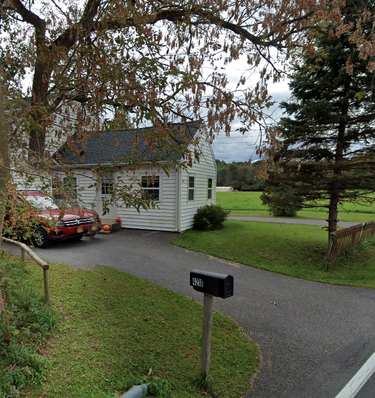Short-term rentals would be allowed and regulated by proposed law
GUILDERLAND — On March 19, the public can weigh in on a proposed town law that would allow short-term rentals in Guilderland.
Supervisor Peter Barber, a lawyer, drafted the bill, which was discussed by the board at its Feb. 6 meeting.
While many municipalities across the nation have recently passed or are in the midst of drafting rules for short-term rentals, Guilderland was spurred by a particular case.
On Nov. 15, the town’s zoning board sided with the town’s code-enforcement officer about an Airbnb on Becker Road, finding it in violation of town code.
Jason Beckmann, who grew up in Guilderland and now lives in Colorado, told the zoning board, over the phone from Colorado, that he had bought the house at 4218 Becker Road to stay in when he visits home and rented it out for a year, through Airbnb, to others who wanted to stay in town.
Beckmann’s lawyer told the zoning board that nothing in the state law or town code specifically addresses short-term rentals like Airbnbs. Guilderland’s code specifically defines inns, bed-and-breakfasts, hotels, and motels.
“I agree with you that we should probably have a law for this but in the absence then it is just simply an interpretation by the zoning board, right?” the zoning board’s chairwoman, Elizabeth Lott, asked the lawyer on Nov. 15.
Lott also said, “When there is something in the code, that makes our job easier, doesn’t it?”
Beckmann’s father read a letter near the start of the Feb. 6 town board meeting from Jason Beckmann and his wife, saying they were basically in favor of the proposed law.
“We believe that establishing clear guidelines is essential and we understand the need for regulation in the rapidly-growing sector,” they wrote, adding they were unsure if the number of short-term rentals in an area would be limited.
“We understand the importance of maintaining the residential character of our neighborhood,” their letter said.
Draft law
The five-page bill requires the owner of a short-term rental unit to fill out an application and pay an annual fee.
The bill also lays out a long list of safety regulations that must be followed such as smoke and carbon-monoxide detectors, fire extinguishers, operational doors, bedrooms — with no more than two occupants — having emergency exits, serviceable electrical and mechanical systems, vented fireplaces, off-street parking for one vehicle per bedroom, and weekly garbage disposal.
A property is not to be rented for more than 240 days per year unless “the short-term rental property or an immediately adjacent property is the principal residence of the short-term rental owner,” the draft says.
The owner is to supply renters with a list of the rules and to supply neighbors within 100 feet of the short-term rental with the name, address, and phone number of someone to contact who will address violations. That contact person is to document all complaints and responses and to submit them to the town’s chief building inspector within 24 hours.
The building inspector is allowed access to check for compliance, and tickets may be issued to owners for violations. A fine of not more than $950 per day may be levied.
In a Jan. 25 memo to the town board, Jacqueline Coons, Guilderland’s chief building and zoning inspector, wrote that, in allowing single-family or two-family dwellings to be occupied on a transient basis, “It seems appropriate that the use be regulated differently than commercial hotel/motel occupancies as it is a less intense use and as such could be compatible with locations that may not be zoned a commercial district.”
Board discussion
The bill establishes “quiet hours” between 10 p.m. and 8 a.m. for short-term rental units. Barber told the board, “”If you think there’s a better way to basically say we don’t want to have disturbances in the neighborhood, if you’ve got better language, I’d be more than happy to throw that in there.”
Councilman Jacob Crawford responded by asking, “If someone were to have a party at their house at 11 p.m. at night and a neighbor would call in a noise disturbance to the police department, what would we deem?”
“They could draft this into their terms and agreements,” suggested Councilwoman Amanda Beedle of the quiet hours.
Barber said of violations, rather than having code-enforcement officers responding, “We want most of these things to be handled by the property owner or property manager.”
Crawford noted the maximum occupancy not exceeding two people per bedroom and asked, “If you were to have a loft that was the size of this room, would you still be limited to two?”
“This all comes from the New York State Building Code for dwellings,” said Barber.
“Somebody might advertise space, saying, ‘We can sleep six or eight’ based upon a pull-out couch or something like that,” said Deputy Supervisor Christine Napierski.
Barber said that wouldn’t be allowed.
“A lot of homes, by the way, are being rented out, and the assessor has no idea,” said Barber.
“It could be a potential new taxing on our resources,” said Beedle.
Napierski referred to “comments made earlier that you want to make sure that people are living in … these residences. They’re not just out of state or, you know, absentee landlords.”
She suggested, “It might make it easier to say we won’t allow it being occupied more than six months out of the year by someone who does not own it.”
Barber said such matters could be decided at the public hearing and he would look for other sample laws.
He noted that the bill would have to be reviewed by both the town’s planning board and the Albany County Planning Board.
The board scheduled the public hearing for 7 p.m. on March 19 at the Guilderland Town Hall.
Other business
In other business at its Feb. 6 meeting, the Guilderland Town Board:
— Approved Emergency Medical Services’ 2024 schedules of rates, charges for vendors, fees for education and training classes, and instructor pay rates.
The fees for transport and support stayed the same. Transport fees range from $1,250 for Basic Life Support to $2,50 for Advanced Life Support 2. Most vendor overtime rates increased;
— Appointed Hannah Clavijo and Tiffany DeCota as emergency medical technicians;
— Approved a determination under the State Environmental Quality Review Act and proposed local law for the rezoning of 1854 Western Ave., and 51 and 53 Hanes Street.
Christopher Laviano told the town board on Dec. 5 that his goal is to “preserve greenspace” on the residential side of his Route 20 lot. The mixed-used building that he plans to construct on the lot, Laviano said, would be better for the community “than just throwing up a couple more houses.” Laviano said it would be “probably years” before he builds “but I’d like to get the local law adopted”;
— Agreed that David Corey, superintendent of Guilderland’s transfer station, can issue a request for sealed bids for grinding and removal of yard waste.
“Are we any closer to bringing this in-house?” asked Beedle to which Barber replied, “Nope.”
He said much of the debris being brought to the transfer station is still from the ice storm last March. Five years ago, Barber said the town budgeted about $150,000 to remove, grind, and dispose of brush.
“This year, it’s going to approach $700,000,” Barber said, speculating that, with global warming causing “extreme storms,” the costs will mount; and
— Authorized the town’s water department to solicit proposals for replacing water meters. Barber said it would be a multi-million-dollar project with water meters in about 12,000 homes.
The town installed the meters 23 years ago “and they usually have about a 20-year battery life,” said Barber.
Napierski asked if the town would have a “rolling program,” and Barber said older homes, like those in McKownville and Westmere, would get replacements first.



